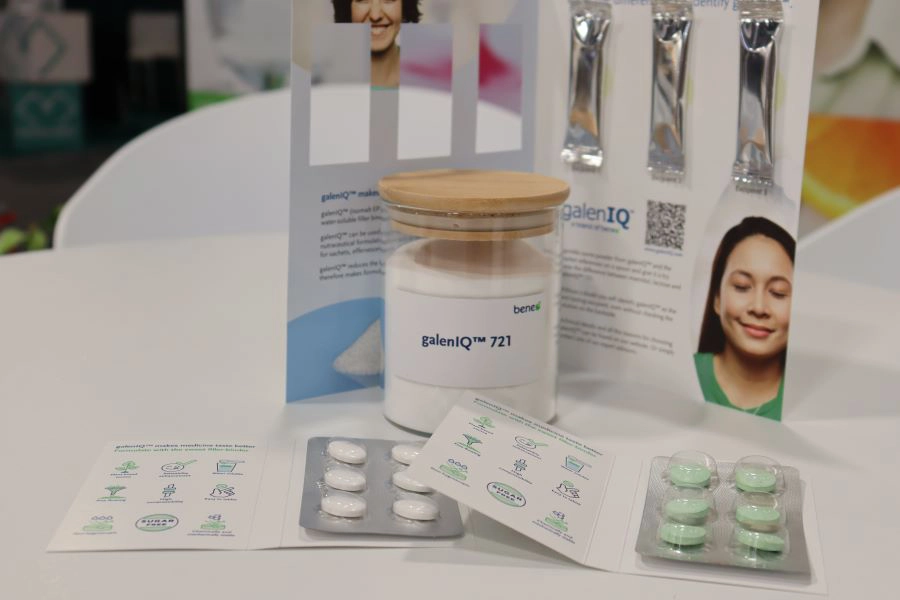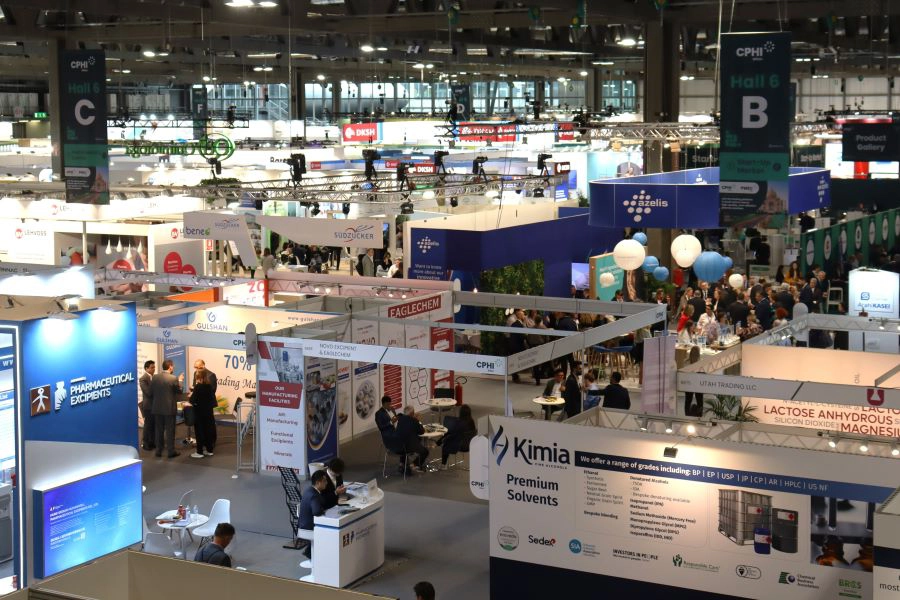The nutraceutical and pharmaceutical industries are set to present their latest innovations in Frankfurt, Germany, at next week’s CPHI 2025 trade show (October 28–30). Exhibitors will showcase a range of natural extracts, active ingredients, excipients, and finished dosage forms for supplements and medications for areas such as immunity, cognition, women’s health, heart health, and metabolic health.
Nutrition Insight explores what to expect at the event from industry players Pharmactive Biotech, Beneo, and ThreoTech.
Carlos Rodriguez, communication manager at Pharmactive Biotech observes a “clear evolution” in the way people understand health. “Mental well-being and emotional balance have become mainstream priorities, while metabolic and cardiovascular health are gaining momentum, especially with the global conversation around longevity and healthy aging.”
“Women’s health is also receiving long-overdue attention, with more brands investing in solutions that are specific, evidence-based, and respectful.”
Maj-Britt Cepok, Ph.D., head of Pharma at Beneo, says the company will spotlight its multifunctional filler-binder galenIQ, helping to enhance patient compliance with an ingredient produced from beet sugar. Cepok says there is a growing market interest in easy-to-process products like galenIQ, which also acts as a bulk sweetener.
“In both the nutraceutical and pharmaceutical markets, demand for palatable dosage forms such as sachets and medicated candies or gummies is on the rise. For these types of products palatability plays a significant role. Combining an appealing taste profile with excellent technical properties can make a huge difference.”
 CPHI Frankfurt 2025 is expecting over 2,400 exhibitors and 62,000 attendees from the pharmaceutical and nutraceutical industries.“We’re keen to discuss how galenIQ can address sensory challenges in the development process, such as bitter notes associated with many active pharmaceutical ingredients or formulations containing herbal extracts, thus contributing to an improved flavor profile.”
CPHI Frankfurt 2025 is expecting over 2,400 exhibitors and 62,000 attendees from the pharmaceutical and nutraceutical industries.“We’re keen to discuss how galenIQ can address sensory challenges in the development process, such as bitter notes associated with many active pharmaceutical ingredients or formulations containing herbal extracts, thus contributing to an improved flavor profile.”
Brain health support
Dr. Rafea Naffa, R&D director at ThreoTech, says the company will showcase Magtein magnesium L-threonate at CPHI, its patented and bioavailable ingredient for brain health. After being on the US market for over ten years, the ingredient gained European Food Safety Authority approval as a Novel Food in Europe last year.
“Magnesium is essential for more than 300 different cellular reactions in the human body, and many brain and nervous system functions in particular,” he highlights.
“However, efforts to support brain health through magnesium supplementation have historically been limited by the poor brain bioavailability and absorption of conventional magnesium compounds.”
Crucially, he notes none have been shown to effectively cross the blood-brain barrier and elevate brain magnesium levels sufficiently to benefit neurological function and cognitive health.
In contrast, Magtein can penetrate the blood-brain barrier and deliver “clinically meaningful levels” of magnesium to the brain. Naffa says the ingredient meets consumer demand for mental health solutions, as it has demonstrated improving cognition, focus, memory, sleep, mood, and anxiety and stress levels in multiple randomized controlled trials.
“Its many brain-health benefits have been scientifically substantiated by a wealth of double-blind, placebo-controlled clinical studies, as well as numerous animal and in vitro trials.”
 Randomized controlled trials have demonstrated Magtain’s benefits in improving cognition, focus, memory, sleep, mood, and anxiety and stress levels.“Interest in it is increasing in two demographics in particular,” he details. “Older consumers are seeking solutions for age-related cognitive decline and memory, while younger consumers are looking for support with multi-tasking, productivity, focus, mood, and sleep.”
Randomized controlled trials have demonstrated Magtain’s benefits in improving cognition, focus, memory, sleep, mood, and anxiety and stress levels.“Interest in it is increasing in two demographics in particular,” he details. “Older consumers are seeking solutions for age-related cognitive decline and memory, while younger consumers are looking for support with multi-tasking, productivity, focus, mood, and sleep.”
Natural health benefits
The experts also note a growing interest in more natural solutions in nutraceuticals and supplements. Rodriguez says that at CPHI, Pharmactive Biotech wants people to see that “natural ingredients can be effective, measurable, and reliable.”
“We’ll be highlighting four of our flagship ingredients: Affron, our clinically backed saffron extract for mood, stress, and sleep; Abg10+, an aged black garlic extract for cardiovascular and metabolic wellness; Liboost, a damiana extract that supports sexual vitality; and Plasys300, a natural pollen extract for men’s health.”
He notes that the company aims to continuously invest in research and transparency, and expand its clinical pipeline to strengthen the evidence behind these natural extracts, while maintaining strict quality and sustainability standards. “Our product line supports mental and cardiovascular health, answering the upcoming trends in 2026.”
As immunity has become a “cornerstone of the nutraceutical landscape,” Beneo’s Cepok says that herbal plant extracts are also widely utilized in immune-health-targeting supplements due to their bioactive components, traditional use, and growing scientific validation. However, she argues that the role of excipients in these supplements is underappreciated.
 Rodriguez says that Pharmactive Biotech aims to expand its clinical pipeline to strengthen the evidence behind its natural extracts.“Incorporating plant extracts into oral dosage forms presents both technical and sensory challenges. Herbal extracts are often oily, hygroscopic, and difficult to compress, affecting tablet stability and size. Sensory issues like bitterness and unpleasant mouthfeel further complicate formulation, especially for chewables.”
Rodriguez says that Pharmactive Biotech aims to expand its clinical pipeline to strengthen the evidence behind its natural extracts.“Incorporating plant extracts into oral dosage forms presents both technical and sensory challenges. Herbal extracts are often oily, hygroscopic, and difficult to compress, affecting tablet stability and size. Sensory issues like bitterness and unpleasant mouthfeel further complicate formulation, especially for chewables.”
She explains that Beneo’s galenIQ, as a water-soluble filler-binder, addresses these hurdles by absorbing oily extracts, improving flowability, and maintaining homogeneity. “It enables robust tablet formation with high content uniformity and rapid disintegration. Additionally, it helps mask bitterness and enhances flavor, promoting patient compliance and making it a valuable excipient for plant-based formulations.”
Moreover, galenIQ can help address challenges in formulating with vitamin C, such as moisture sensitivity, thermal instability, poor flow, compressibility, taste, and potential interactions with other ingredients.
Technology advances
ThreoTech’s Naffa highlights the potential of new technologies, like AI, in providing personalized solutions for consumers’ physical and mental health needs.
“A recent review in Nutrients suggested that AI could revolutionize nutrition research by simultaneously analyzing lifestyle, culture, health conditions, and genetics to enable precision nutrition.”
“These trends present significant opportunities for our Magtein ingredient to meet consumers’ individual brain health needs,” he says. “Additionally, innovative delivery formats featuring Magtein are gaining momentum, with recent launches including convenient shots, liquid sachet packs, powders, and chewable tablets. These options empower consumers to select the format that best fits their preferences and lifestyle.”
Pharmactive Biotech’s Rodriguez adds that technology and AI is helping the company work smarter and faster. “We’re using it to organize and connect large volumes of scientific and market information, making it easier for our teams to identify trends, track new evidence, and support partners with accurate data.”
 Cepok notes that galenIQ can be used in common tablets, mini tablets, sachets, effervescents, syrups, lozenges, candy, and gummies.“It’s not about replacing human expertise but about amplifying it,” he underscores. “At the same time, we’re developing digital tools that centralize all product knowledge, from clinical and regulatory data to communication assets, using AI to improve organization and accessibility. This allows us to be more agile and ensures that reliable, updated information is always within reach.”
Cepok notes that galenIQ can be used in common tablets, mini tablets, sachets, effervescents, syrups, lozenges, candy, and gummies.“It’s not about replacing human expertise but about amplifying it,” he underscores. “At the same time, we’re developing digital tools that centralize all product knowledge, from clinical and regulatory data to communication assets, using AI to improve organization and accessibility. This allows us to be more agile and ensures that reliable, updated information is always within reach.”
Pharma 5.0
Cepok notes there are “exciting times ahead for the life science industry” with the emergence of Pharma 5.0 and the rapidly evolving digital environment. Compared to the smart factories in Pharma 4.0, the industry is moving toward smart collaboration between humans and machines. For example, digital twin technology creates virtual replicas of production systems to simulate and optimize manufacturing.
She highlights that in the pharmaceutical industry, when used properly and monitored appropriately, AI promises to accelerate drug discovery, personalize treatments, improve patient outcomes, reduce costs, and contribute to supply chain optimization.
“Likewise, advanced techniques such as continuous manufacturing, machine learning, and 3D printing will improve operational efficiency, make the production lines of the future more agile and facilitate the introduction of genuinely personalized medicines.”
According to Cepok, the potential benefits are huge, although certain challenges still need to be addressed like data privacy, regulatory compliance, and a full understanding and acceptance of the algorithms being used.
“Combined, all these elements of Pharma 5.0 represent a paradigm shift in pharmaceutical manufacturing, paving the way for a future in which medications are developed faster, customized to individual patient needs, and delivered with uncompromising quality,” she notes.
Meanwhile, she underscores that these developments are not only about innovation. “It’s about transforming the way we think about healthcare and ultimately improving the lives of patients around the world. As users, we must put measures and controls in place and acknowledge that the next steps in our own human development may come with some digital assistance.”
Manufacturing processes are advancing as well, adds Cepok, fulfilling the demand for reduced production time and costs. “Besides classic batch production, semi-continuous and even completely uninterrupted production (continuous manufacturing) of pharma- and nutraceuticals are on the rise.”

